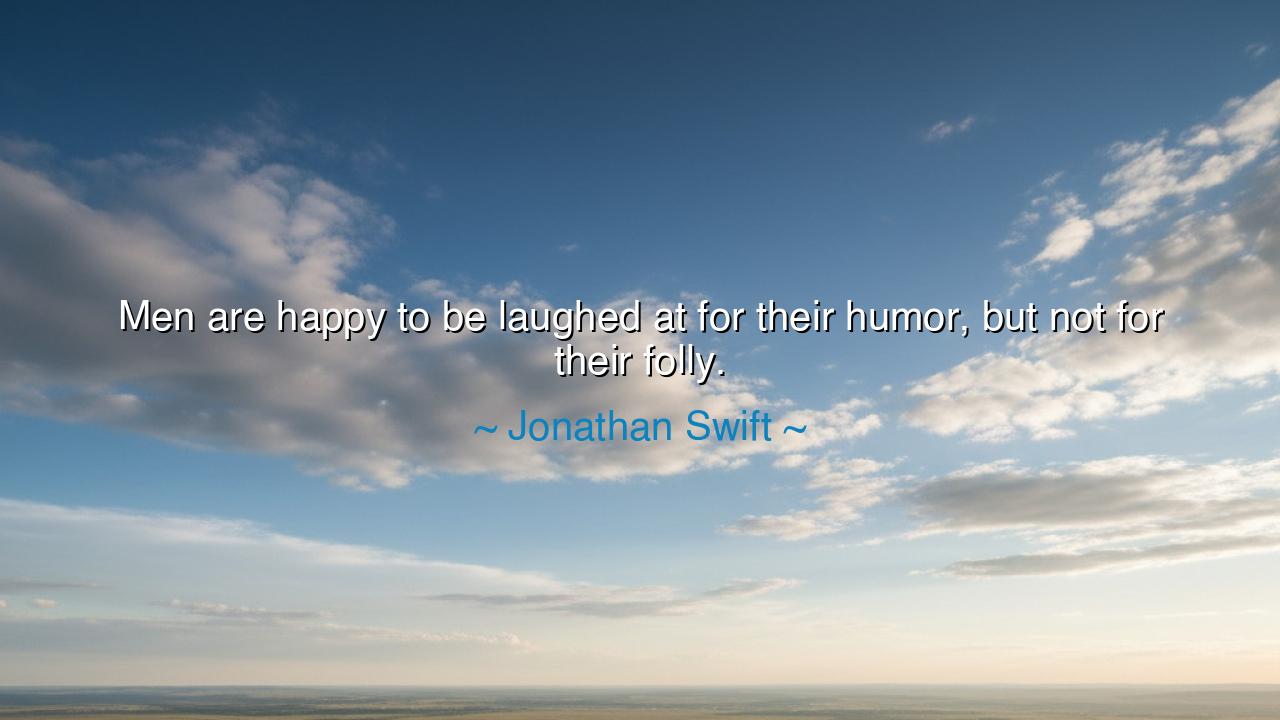
Men are happy to be laughed at for their humor, but not for their






In the enduring wisdom of Jonathan Swift, the keen satirist of humankind’s pride and paradoxes, there lies a mirror to the human heart: “Men are happy to be laughed at for their humor, but not for their folly.” In this simple sentence dwells the vast landscape of human vanity — the way we crave admiration even in jest, yet recoil when laughter unmasks our weakness. Swift, who saw through the masks of society with the unflinching eye of truth, reminds us that mankind’s pride is a delicate creature: it will endure laughter only when it is chosen, but never when it is deserved.
To be laughed at for one’s humor is to feel powerful — to command the laughter of others as a lord commands his court. It is laughter that flatters, laughter that crowns the speaker with wit, as if saying, “Behold this mind, sharp and nimble, whose words delight and amuse.” Such laughter feeds the ego, for it proclaims not shame but mastery — mastery of timing, tone, and intelligence. A man who can make others laugh feels adored, admired, even envied, for he has stirred joy in others while remaining untouched himself. Thus, humor, when wielded with grace, becomes not merely expression, but power — the art of ruling hearts through levity.
Yet folly — ah, folly cuts the other way. To be laughed at for one’s folly is to stand naked before truth. It is to have one’s vanity unmasked, one’s illusion shattered. For while humor reveals control, folly exposes the lack of it. Swift knew this intimately, for he lived among politicians, clergymen, and scholars whose pomp often outshone their wisdom. When he wrote Gulliver’s Travels, he painted humanity with both brilliance and mockery, showing how men puff themselves with pride, only to stumble over their own foolishness. They could endure being called witty, but not being shown as absurd. In his words, he held a torch to the soul’s hypocrisy, and in that light, the proud saw themselves as they truly were — and trembled.
Consider the story of Socrates, the philosopher who, though revered for his wisdom, was often laughed at by his fellow Athenians. His humor was dry, his questions probing, his wit sharp as a blade — yet it was not laughter he sought, but truth. He often turned the jest upon himself, showing that to embrace one’s own folly is to disarm it. When his accusers mocked him, Socrates did not bristle; he smiled. In his serenity, he revealed what Swift later echoed: that the wise are not those who flee laughter, but those who accept it as a teacher. To be mocked for folly and learn from it — this is strength greater than wit.
Jonathan Swift’s insight sprang from the age of Enlightenment, when reason was worshiped and pride disguised itself as intellect. In such an age, men built towers of logic but feared ridicule more than ignorance. Swift, through satire, struck at this weakness, reminding humanity that laughter is both medicine and mirror. Those who can laugh at themselves are cured of delusion; those who cannot are consumed by it. For pride, when too brittle to bear laughter, cracks under the weight of truth. And so, he wielded humor as a blade of wisdom, cutting through vanity to reveal humility beneath.
The lesson, then, is timeless: welcome laughter that exposes your folly, for it is the laughter of truth. It teaches where pride blinds. When others laugh at your humor, rejoice; when they laugh at your mistakes, reflect. Do not flee from folly, for it is the teacher of wisdom. Every stumble, every misstep, every jest at your expense is a gift — an opportunity to rise clearer, lighter, freer. The one who can laugh at himself has no enemy that pride can use against him. For laughter, when turned inward, becomes enlightenment.
Therefore, let this teaching be passed down as a sacred wisdom: humor and humility must walk hand in hand. Let your wit sparkle, but let your spirit remain grounded. Accept laughter in all its forms — not as judgment, but as reflection. For to laugh at one’s own folly is to be free from shame, and to laugh at life’s absurdities is to be free from fear. Swift’s words remind us that the difference between the fool and the wise man is not who is laughed at, but who can laugh back — with grace, with understanding, and with love for the fragile, beautiful comedy of being human.






AAdministratorAdministrator
Welcome, honored guests. Please leave a comment, we will respond soon